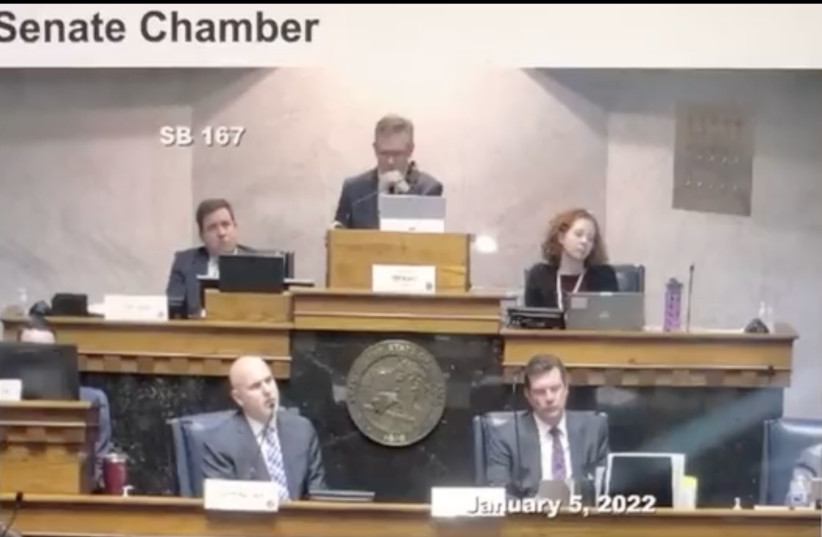A Republican state senator in Indiana has apologized for suggesting during a hearing on his education bill that teachers in the state shouldn’t “take a position” on Nazis.
“Marxism, fascism, Nazism, I’m not discrediting any of those ‘isms’ out there,” State Sen. Scott Baldwin had said during a Jan. 5 committee hearing on his “Education Matters” bill. “I believe that we’ve gone too far when we take a position on those ‘isms.'”
“We need to be impartial,” Baldwin continued. “We just provide the facts. The kids formulate their own viewpoints.”
Baldwin had been responding to a public school teacher, Matt Bockenfeld, who objected to the bill by providing examples of how its bans on teaching “certain concepts” would prevent him from teaching students about topics including slavery, the Jim Crow era, and Nazis.
In an email to the Indy Star the next day, Baldwin said he had misspoken.
“Nazism, Marxism, and fascism are a stain on our world history and should be regarded as such, and I failed to adequately articulate that in my comments during the meeting,” he told the paper. “I believe that kids should learn about these horrible events in history so that we don’t experience them again in humanity.”
Baldwin also said he had invited Bockenfeld to help work on the bill with him, an invitation Bockenfeld told the Star he accepted.
Baldwin’s bill is co-authored by six other Indiana state senators, all Republicans. The bill does not mention Nazis or any other ideology by name, but contains a long list of “certain concepts” it would forbid schools from teaching — all of which fall under the rubric of the largely Republican-led nationwide push against critical race theory.
For example, the bill would forbid schools from teaching students that “any sex, race, ethnicity, religion, color, national origin, or political affiliation is inherently superior or inferior to” any other, and “that an individual, by virtue of the individual’s sex, race, ethnicity, religion, color, national origin, or political affiliation, bears responsibility for actions committed in the past by other members of the same sex, race, ethnicity, religion, color, national origin, or political affiliation,” among other similar topics.
Jewish scholars have argued that banning such topics would adversely affect instructors’ abilities to accurately teach the Holocaust and other examples of historic antisemitism. Holocaust education has already been pulled into the critical race theory debate: Last fall, a school district administrator in Texas said that the implementation of a similar law in that state would require teachers to teach “opposing” views about the Holocaust.
Baldwin told the Indy Star that one of his motivations is to prohibit schools from teaching any concepts that “divide and stereotype people.” A parallel bill in the Indiana House of Representatives contains similar wording.
Critical race theory is never mentioned in either bill, but the legislation follows all the hallmarks (and nearly identical wording) of efforts in statehouses and local school boards over the past year to sharply curtail the teaching in public schools of issues touching on systemic and historic discrimination. Similar bills in other states have attempted to ban the teaching of what is often euphemistically referred to as “divisive topics,” and give parents more power in steering their children’s teachers’ lesson plans away from such topics. Some Republican-led think tanks have written sample legislation for state lawmakers to adopt.
Baldwin’s bill would also require teachers to post their lesson plans publicly online prior to each semester to allow parents to review them, and create a “Curricular Materials Advising Committee,” to be chaired by and made up largely of parents, who would have the opportunity to review and provide notes on classroom materials before they are taught.
Critical race theory was also a top issue in Virginia’s gubernatorial election last year, which Republican Glenn Youngkin won.
Baldwin’s comments were also notable given that his name has been linked to the Oath Keepers, a right-wing extremist group that played a role in the Jan. 6, 2020, attempted insurrection. Baldwin has denied that he is a member of the group.

